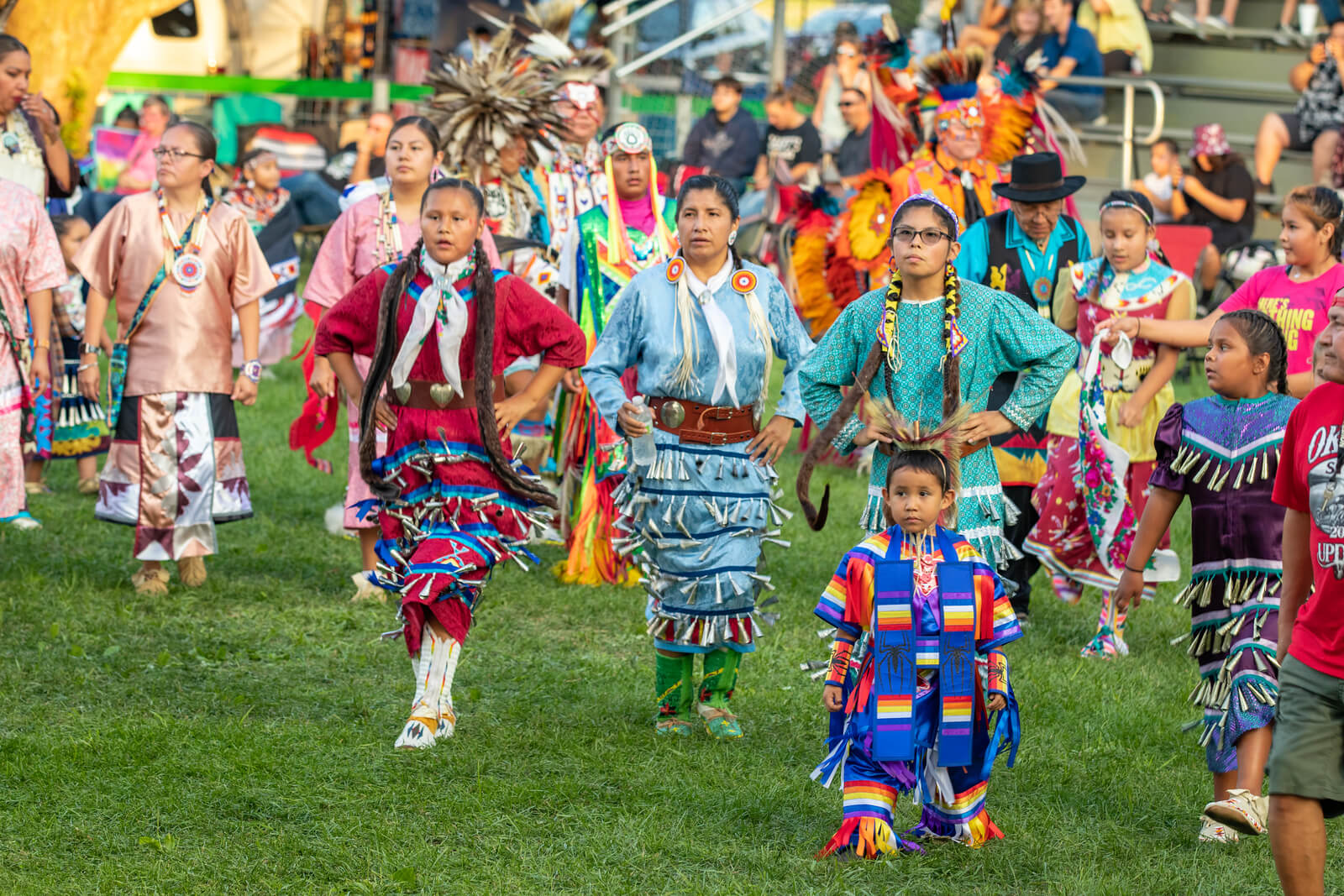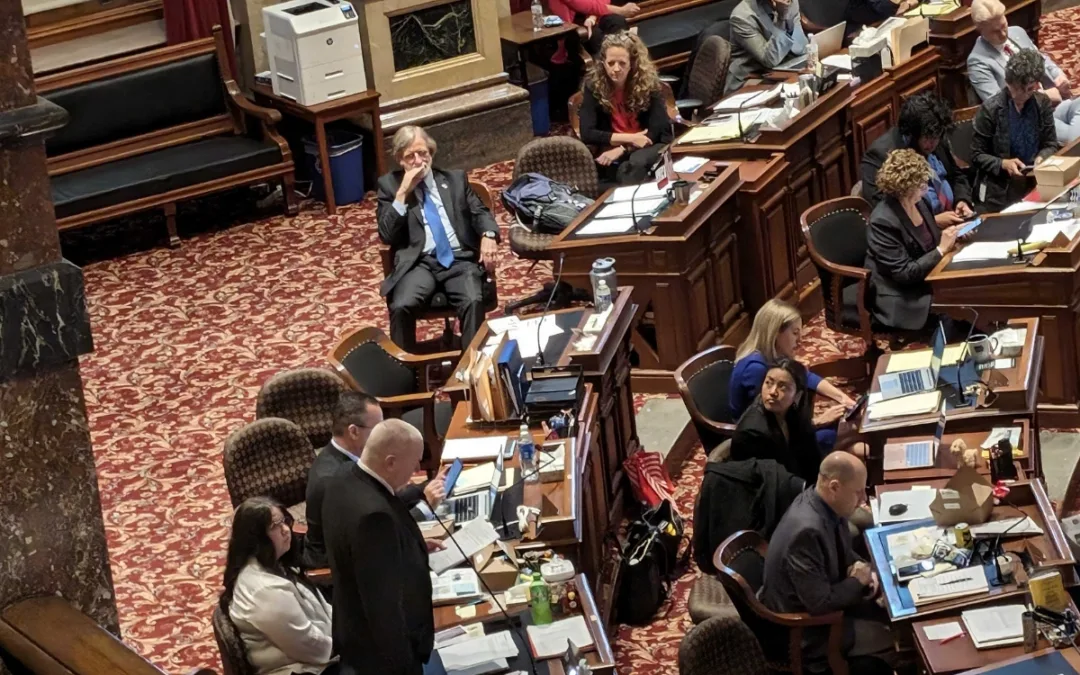
Courtesy of Meskwaki Media Services
The Meskwaki Nation is Iowa’s only federally recognized Indian tribe. They reside on more than 8,600 acres of native land in Tama County.
In honor of Indigenous Peoples’ Day on Oct. 11, we’ve put together this list of important things to know about the Meskwaki Nation. Indigenous Peoples’ Day—which was first formally recognized by US president Joe Biden last year—provides an opportunity for us to honor the past, present, and future of Native Americans. In addition to recognizing the way colonialism affected Native Americans, we also get to celebrate their culture and contributions.
Meskwaki means “People of the Red Earth.”
The genesis of the name Meskwaki, comes from meškwahki·haki, initially transliterated to English as Mesquakie. The term Meskwaki means “people of the red earth.” Early members adapted this name from the reddish soil where they lived, primarily in Ontario, Canada’s St. Lawrence River Valley. Throughout history, the Meskwaki dispersed throughout Michigan, Wisconsin, Illinois, and Iowa.
[inline-ad id=”0″]
The Meskwaki Nation is made up of two tribes.
The Meskwaki, like other Native tribes, faced conflict with white settlers. The French called the Meskwaki renards, the French word for foxes. The Meskwaki fought against French settlers in the Fox Wars (1701-1742). The Meskwaki allied with the Sauk or Sac, whose name comes from the native word Asakiwaki, which means “people of the yellow earth.” They allied together in 1735 to fight European settlers and other Native American tribes.
The Meskwaki and Sauk are both of Algonquian origin and share the same language, so the US government officially combined the two tribes into the Sac and Fox Confederacy after the Blackhawk War of 1832. Today, the Meskwaki Nation is formally refereed to the Sac and Fox Tribe of the Mississippi.
[inline-ad id=”1″]
The US government removed the Meskwaki Nation from their homeland.
Once President Andrew Jackson signed the Indian Removal Act of 1830, the US government used treaties to take lands away from Native tribes, including the Meskwaki, and forcefully remove them. In the Treaty of 1842, the federal government and Iowa received all the Sac and Fox land claims. The terms of the treaty let the Meskwaki gradually relocate as long as they moved west of the “red rock line” by 1843 and reached a reservation in Kansas by 1845.
The Meskwaki chief reluctantly agreed to the treaty that opened up Iowa for settlement ultimately leading to statehood. The Meskwaki left their Iowa homeland in small groups that headed in multiple directions. Some stayed in Iowa and others who longed for their homeland returned a few years later. Their continued presence in Iowa served as grounds for the State of Iowa to enact a law allowing the tribe to maintain residence in the state.
Today’s Meskwaki Nation does not live on an Indian reservation.
[inline-ad id=”2″]
Most people think of Indian reservations when they think of Native Americans in the United States. It’s true that most tribes live on protected reservations; however, the Meskwaki Nation has private land that was not granted by the US government. After many Meskwaki returned to Iowa, they purchased 80 acres of land in Tama County in 1857, leading to their formal recognition as the “Sac & Fox Tribe of the Mississippi in Iowa.”
Their unique situation allowed them to receive payments from the federal government, but the US and state governments basically ignored them because they owned private land. The tribe earned money by trapping and saved annuity payments to continue to purchase more acreage between 1867 and 1901, until they had close to 3,000 acres. In 1987, the Meskwaki acquired more land, putting their holdings to more than 7,000 acres.
The fact that the Meskwaki bought private land created some confusion over who had jurisdiction and allowed them to live quite independently compared to other tribes whom the federal government heavily scrutinized. Eventually, Iowa gave up jurisdictional authority to make things simpler. Today, the sovereign Meskwaki Nation includes more than 8,100 acres in Tama, Marshall, and Palo Alto counties.
[inline-ad id=”3″]
The Meskwaki Nation continues to grow and change to provide for its people.
The Meskwaki Nation is the largest employer in Tama County; they continue to improve housing and infrastructure and provide amenities and jobs for those who live on the settlement. In addition to the Meskwaki Bingo, Casino & Hotel, the tribe has a school, health clinic, and business center.
Since the turn of the century, the Meskwaki Nation purchased a bank, built a travel plaza, and created the Natural Resources and Buffalo Wildlife Project. They incorporated Meskwaki Inc. and other subsidiaries to create sustainable business opportunities for tribe members. For example, they built a 40-acre self-sustaining farm and began growing industrial hemp in 2022. Additionally, they are currently building a 76,000 sq. ft. recreation facility that includes community and youth gathering areas, classrooms, a daycare, a gymnasium, track, weight room, an outdoor splash park, and more.
You can learn more about the Meskwaki Nation and keep updated on the new and exciting things they are doing by visiting their website at www.meskwaki.org.
by Jessica Lee
10/06/22
Iowa Starting Line is part of an independent news network and focuses on how state and national decisions impact Iowans’ daily lives. We rely on your financial support to keep our stories free for all to read. You can contribute to us here. Also follow us on Facebook and Twitter.
[inline-ad id=”0″]
Politics

AEAs cutting workers in wake of Republican legislation
Iowa legislators said a new bill cutting money for agencies that help students with disabilities wouldn't affect services. But area education...

He said what? 10 things to know about RFK Jr.
The Kennedy family has long been considered “Democratic royalty.” But Robert F. Kennedy, Jr.—son of Robert F. Kennedy, who was assassinated while...
Local News

No more Kum & Go? New owner Maverik of Utah retiring famous brand
Will Kum & Go have come and gone by next year? One new report claims that's the plan by the store's new owners. The Iowa-based convenience store...

Here’s a recap of the biggest headlines Iowa celebs made In 2023
For these famous Iowans, 2023 was a year of controversy, career highlights, and full-circle moments. Here’s how 2023 went for the following Iowans:...







